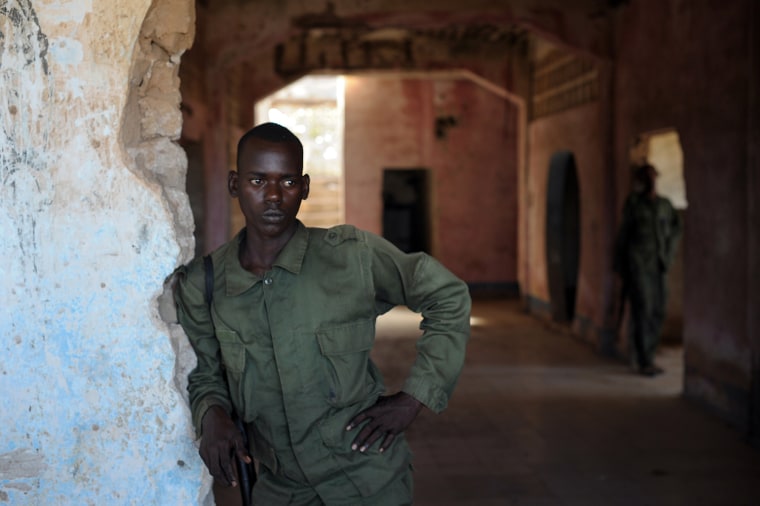
Somalia's defense minister made an international plea to aid its struggling government, saying it cannot fight the terrorist group behind Kenya's mall massacre without more funding and weapons from the global community.
"We are not looking at jet fighters. It’s small arms," Abdulhakim Haji Faqi told NBC News. "We need the funding and resources."
He warned that the attack on the Westgate mall should be a wake-up call illustrating that Somalia-based terror organization al Shabaab was now a “global problem.”
“We need to defeat them ideologically and militarily," Faqi said. "If we had more weapons, they would be less of a problem by now. ... The way to help is to fund the Somali government."
Faqi said there had been "lots of promises but no deliverance" from the West.
In March, the U.N. Security Council partially lifted an arms embargo on Somalia dating back decades so it could continue its fight against al Shabaab. And both the U.S. and the E.U. have provided billions in aid for development and security in the African nation -- the U.S. has pledged $1.5 billion since 2009, according to the Wall Street Journal, and the EU recently pledged 650 million euros (or $868 million).
Still, the Somali defense minister said his troops lacked the firepower to take on the al Qaeda-linked group and were relying on AK-47s similar to those used by the militants.
“We are underfunded. We don’t have the proper weapons to fight al Shabaab,” Faqi said.
Faqi said the rampage targeting shoppers in Nairobi, in which at least 72 people were killed, showed why the international community needed to help his forces defeat al Shabaab.
“This attack on innocent people, women and children, shows the real nature of al Shabaab. They kill civilians,” he said. “It also underlines this is not just a Somali issue, but a global issue, and we all need to come together with a concrete plan and resources to combat [al Shabaab].”
Funding from the international community has meant an increase in soldiers’ wages – with troops now getting $60 per month in a food allowance, up from $30 each month.
But Faqi said "logistical support" – including mobile units to help transport the troops to remote areas outside Mogadishu that are al Shabaab strongholds – would help them tackle the group.
In an interview with Britain's Channel 4 News on Wednesday, Somali President Hassan Sheikh Mohamud echoed Faqi's comments.
He said al Shabaab controlled "small parts" of the country which were being used as a "bomb factory" as well as for training and to "brainwash" young Somalis.
Somalia has gone from crisis to crisis over the past three decades, with civil war throwing the country into chaos and giving rise to several autonomous regions.
From the early 2000s, the Transitional National Government has attempted to restore control, but its efforts have been hampered by al Shabaab and other remnant militant groups from the civil war that dispute its reign.
The African Union has led a military intervention in Somalia, for which al Shabaab said the Kenya attack was payback. There are fears among Somali officials about what might happen when the African Union’s mandate ends, and that’s a major reason why they want to improve their own forces.
The African Union troops have dented the group's influence on land, and piracy in open waters off the coast of Somalia has dropped significantly as a result of aggressive patrolling by international naval forces, coupled with the use of private armed security contractors onboard vessels, experts say.
Jason Mosley, an associate fellow at London-based security think tank Chatham House, said it as not as simple as training the troops – Somalia must then keep hold of them.
"There's still a lot of work to do bringing the Somalian army up to speed in terms of discipline and making sure troops stay in the army and don't go into al Shabaab or other militant groups," he said. "It isn't as simple as the government saying, 'Arm us, and we will take care of everything.'"
Alexander Meleagrou-Hitchens, head of research at King's College London's International Centre for the Study of Radicalisation, also said the situation on the ground in Somalia was more nuanced.
"Putting weapons into that situation without understanding where they will end up would be a cause for concern," he said.
Al Shabaab formed in 2006 from the Islamic Courts Union that ran the Somali capital, Mogadishu.
The U.S. National Counterterrorism Center says al Shabaab does not have a centralized agenda but that most members are interested in fighting the Somali government for territorial control. Many of its rank-and-file members are not concerned with global jihad, according to the center.
NBC News' Laura Saravia contributed to this report.
Related: